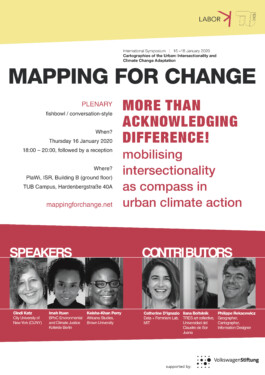detour 305_via Plenary
More Than Acknowledging Difference! Mobilizing Intersectionality as Compass in Urban Climate Action
By: Mapping Change Team

Source/Link:
K LAB, 2020
Description:
Public Plenary. 16 January 2020, 18:00 – 20:00, PlanWirtschaft (PlaWi), TU Berlin.
In this Plenary we explored new ways to view intersectionality, less as a conceptual flag and more as a mobilizing force around issues of social and environmental violence, and therewith the plaguing inequalities that are structurally engendered through (but certainly not limited to) urban policies. Through inputs by invited speakers and video contributions, this Plenary shed light on the contradictions of (mostly western) environmental justice movements, particularly in regards to the flattening of the question of life and the role they are playing in blurring talks on coloniality and the afterlives of colonialism and slavery. We touched on ways to mobilize difference in order to combat social and environmental violence on both levels: the behavioral (the everyday) and the structural (influence systems of knowledge production and urban governance). Hence, connecting the previous to the foci of our research project “Mapping for Change”, we discussed what social questions and modalities can help us re-think and modify mapping tools and the ways we use them. Specifically, we discussed questions and principles that mapping processes should address to help communicate some of the complex ethnographic knowledge in order to create rooted, alternative awareness. Within this frame, we discussed how mapping can be a means for communicating intellectual projects that make political stances against the powerful by connecting anti-capitalist, anti-racist, and anti-sexist struggles and solidarities.
For pictures of the session and the names of participants see detour 306_via a January encounter and for more information about the agenda and structure of the workshop see entry 3.1 Anticolonial Mapping
Speakers
Cindi Katz, Imeh Ituen and Keisha-Khan Perry
Video Contributions
“Data Feminism” by Catherine D’Ignazio, presenting her work on data visualizations, contesting power and related issues.
“Waste Entanglements: the agency of objects” by Ilana Boltvinik, presenting her work on public space, trash, mapping and engagement of communities.
Discussant
Philippe Rekacewicz
Moderator
Natasha Aruri
Camera and Editing: Poppy Imogen Illsley
Organized by K LAB, TU Berlin
Supported by the VolkswagenStiftung
We would like to thank the PlaWi Café & Projektrat (Students Council) at TU-Berlin’s Institute of Urban and Regional Planning (ISR) for providing their space and logistical support.
Back to Text